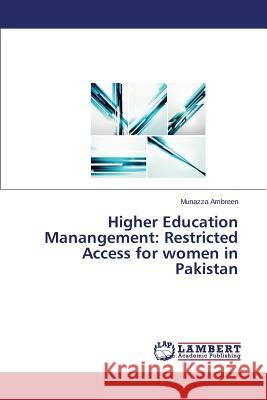Higher Education Manangement: Restricted Access for Women in Pakistan » książka
Higher Education Manangement: Restricted Access for Women in Pakistan
ISBN-13: 9783659588631 / Angielski / Miękka / 2014 / 72 str.
The study aimed to explore the factors responsible for gender gap in higher education management in Pakistan. A descriptive research design was used to explore the phenomenon.While comparing the views of the administrators, males were found to be more conservative and stereotyped in their views. Majority of them thought that higher education management was a job more suitable to the males. Majority of male administrators showed their belief that not only males were more capable to cope with the responsibilities associated with the managerial jobs in the field of higher education but also there were certain tasks which could be performed by male managers only. These biases and stereotypes present in male administrators might be the basic cause of gender gap in higher education management because male administrators dominated in numbers and authority. As a result, their perceptions had a great impact upon the policies, practices and environment of the higher education. It is suggested that stakeholders must ensure females' broadened access to education. Discouraging the stereotypes is another step to enhance female representation in management of higher education.
The study aimed to explore the factors responsible for gender gap in higher education management in Pakistan. A descriptive research design was used to explore the phenomenon.While comparing the views of the administrators, males were found to be more conservative and stereotyped in their views. Majority of them thought that higher education management was a job more suitable to the males. Majority of male administrators showed their belief that not only males were more capable to cope with the responsibilities associated with the managerial jobs in the field of higher education but also there were certain tasks which could be performed by male managers only. These biases and stereotypes present in male administrators might be the basic cause of gender gap in higher education management because male administrators dominated in numbers and authority. As a result, their perceptions had a great impact upon the policies, practices and environment of the higher education. It is suggested that stakeholders must ensure females broadened access to education. Discouraging the stereotypes is another step to enhance female representation in management of higher education.











